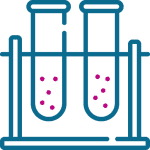Cancer marker CA 19-9 (pancreatic)
CA 19-9 has a clinical sensitivity of 70-80% for pancreatic cancer. Evaluated together with CEA as a secondary marker for gallbladder, colon and stomach cancer; for liver metastases.

Pancreatic cancer marker (Ca 19-9) is a key marker of pancreatic cancer, accounting for up to 80% of all cancers. accuracy. In pancreatic cancer, the level of CA-19-9 in the blood is directly related to the size and stage of the tumour (if the tumour is larger, the CA-19-9 value will be higher). This test, together with the carcinoembryonic antigen (CEA) test and an increase in both, can be used to suspect biliary, colorectal and gastric cancer or liver metastases. This cancer marker is also used to monitor the treatment and recurrence of gynaecological (breast, ovarian) cancers.
CA 19-9 is a marker for pancreatic cancer. Evaluated together with CEA as a secondary marker for gallbladder, colon and stomach cancer; for liver metastases. Elevated levels of CA 19-9 are found in acute hepatitis, chronic active hepatitis, gallbladder and ductal diseases, inflammation of the pancreas (pancreatitis) and rheumatism.
CA 19-9 has a clinical sensitivity of 70-80% for pancreatic cancer. Over 45 years of age. In patients who have vague complaints in the upper epigastrium, with sluggish symptoms persisting for 2-3 weeks and no obvious pathological processes can be found, a CA 19-9 index is recommended.
This cancer marker can rise before the tumour is picked up by other instrumental tests. The reverse can also be true, where CA 19-9 shows no increase and a tumour is detected, for example on a CT scan. Laboratory and instrumental methods of investigation are not contradictory. A suspicious change in at least one of these tests may be a prerequisite for further investigation of the patient.
You can consult our family doctors.



